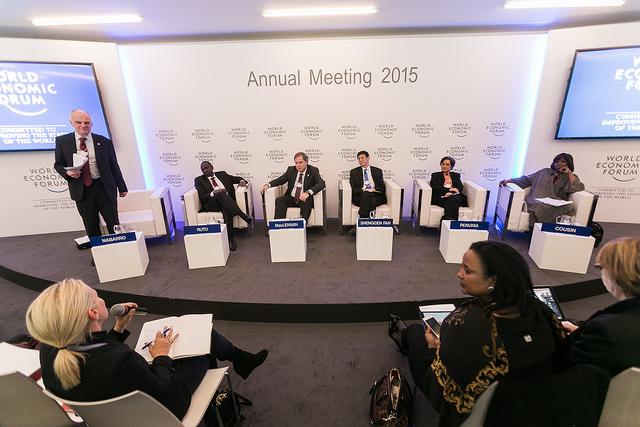Small scale family farmers face big challenges. They have to increase yields to produce more for society. But in so doing, they must provide nutritious food, increase their incomes, adapt to the changing climate, protect their ecosystem and reduce greenhouse gas emissions. Small scale family farmers have a response to these challenges: sustainable, agro-ecological and inclusive approaches to agriculture and agro-based enterprises with them through their organizations.
This, in summary, was the key message delivered by AFA Secretary General Esther Penunia during a panel session on “Ensuring Global Food Security” held last January 23 on the occasion of the 2015 Annual Meeting of the World Economic Forum (WEF) in Davos, Switzerland.
In her intervention, Ms. Penunia outlined some features of sustainable agriculture:
-production technologies that improve and enhance the soil’s health, use organic materials and nutrients, promote biodiversity, reduce wastage and promote nutrient recycling, promote diversification and integration, build on local knowledge and wisdom and allow farmers to continuously innovate;
-marketing and distribution systems that are economically rewarding: fair and good price for their products, adequate access to finance, markets and information, increasing participation in processing their products; and,
-farmers are strongly organized into associations and cooperatives along geographical and commodity lines and they are empowered to engage governments, businesses in policy and program formulation and implementation as well as in managing their own organizations and enterprises.
To be inclusive, she emphasized that women and men farmers, through their organizations, should have significant participation in decision making processes of the businesses, including setting prices, contracts, and valuation of their labor and production costs, as well as appropriate sharing of risks and benefits
Panelists to the session included Mr. Ertharin Cousins, Executive Director of the UN’s World Food Program (WFP); Shenggen Fen, Director General of International Food Policy Research Institute (IFPRI); David McLennan, President and CEO of Cargill USA; and Deputy President William Ruto of Kenya. The session was moderated by David Nabarro, Special Representative of the UN Secretary General for Food Security and Nutrition.
The panelists agreed that food security policies for the future should focus on partnerships with the private sector, governments and farmers cooperatives and associations, with the latter being recognized as equal partners.
Click here for the link to the Synopsis of the Panel Session by WEF
Click here for more photos from the WEF panel session




Comments are closed